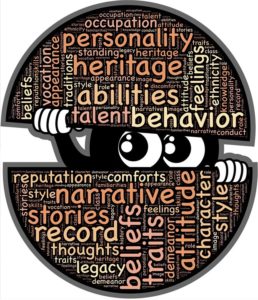It never ceases to amaze me how often professional speakers, presentation skills trainers, and public speaking coaches say that good communication “is not about you,” and then they proceed to talk about themselves.
So which is it? Should you talk about yourself or not?
Once again, the traditional, cliche advice is wrong–or at least misleading.
It IS about YOU!
YOU matter! In fact YOU matter more than your content matters. YOU matter more than your assignment. YOU matter more than your script. When you have the spotlight, YOU matter more than your company, or your boss, or even dare I say, your audience.
If you believe your content matters more than you do, then you believe you don’t matter–that you are replaceable. However, when you matter more than your content, you are an indispensable resource, and they will keep coming back to YOU.
The objections
But, but, but … even the professionals say it’s about your audience, not about the speaker!
This is a perfect example of when you should do as they DO and not as they SAY. I can pretty much guarantee that if you turn on a video of pretty much any motivational speaker they will start talking about themselves.
I never said it’s NOT about your audience. Of course, your audience matters. Of course, you should tailor make your presentation to the audience. That doesn’t mean it’s not about you too. Tailoring to the audience is a great subject for another day. Today, you matter too.
Almost without fail, when someone contacts me with anxiety, or when someone wants coaching to become more engaging and more confident, my diagnosis is the same:
You need to talk about yourself more!
Nearly every time I say this, I’m immediately challenged:
- “But, it’s not supposed to be about me …
- “But, I represent my company, not myself …
- “But, I could never show off in public …
- “But, I don’t want to sound egotistical …
- “But, that would be inappropriate …
- “But, but, but …
It’s almost like I touch a nerve, which only proves I touch on the core of the problem:
Most bad presenters are pretending to be someone else
The solution is to “talk about yourself” more … as long as you do it in the right way! Let me repeat … as long as you do it in the right way!
The principle
The idea behind self-disclosure is a frequent subject of research in teaching and instructional design. Countless studies prove that those leaders who self-disclose are more influential, more likable, and more successful.
People don’t like lectures, people like conversations
People love you in real life!
The awkward, anxious, uncomfortable feeling rarely happens in a real life conversation with a friend. The solution to anxiety (and boring-ness) on stage is to make the stage feel more like that friendly conversation.
When you act differently during a presentation than you do in real life, you come off as different. Why should listeners listen to you and love you, if you’re not sharing the parts of yourself that people normally love?
There was a time in our society in the past (still in some cultures) where anything but a staid lecture behind a lectern seemed inappropriate. Not anymore!
I guarantee that every time you leave a meeting saying “Wow, that was a great speaker” you also feel like you know something about the speaker personally.
On the other hand, every time you feel like you attended a dull, pointless lecture, you feel like you know nothing about the speaker’s real personality. Or perhaps, you think the speaker really is dull. Nobody is really that dull and boring — they just look that way on stage when they pretend to be someone else.
The Science
Research shows that in ordinary casual conversation you will spend between 40% – 60% of the time talking about yourself (ScientificAmerican 2013).
In other words, if you wanted a speech to sound exactly like a conversation, you would spend 40% – 60% of the time talking about yourself.
CLARIFICATION: I’m not recommending that you actually talk about yourself 60% of your speech! Obviously, most presentations require you to spend the majority of your time on the actual content of your speech.
BUT … you don’t have to go all the way to ZERO!
 Unfortunately, most “boring” speakers remove themselves completely and spend 100% of the time lecturing and 0% of the time talking about themselves. A 0% personal lecture will sound 0% like a conversation.
Unfortunately, most “boring” speakers remove themselves completely and spend 100% of the time lecturing and 0% of the time talking about themselves. A 0% personal lecture will sound 0% like a conversation.
My core message is simple:
The more you talk about yourself, the more it will sound like a conversation.
40% of a presentation dedicated to yourself, is not at all unreasonable in most situations. The more inspirational your goal, the more YOU matter.
Of course conversations also require, questions, answers and back-and-forth interaction. That is the subject for another day.
Appropriate self-disclosure
Lots of my clients are at first nervous when I tell them to “talk about themselves,” because we’ve all seen that speaker who “talks about himself” so much that he seems self-centered and awkwardly narcissistic.
So let me repeat what I’ve already said. The solution is to “talk about yourself” more … as long as you do it in the right way!
It’s not really to talk “ABOUT” yourself!
We need to immediately change the words I’ve been using. The reason “talking about yourself” sometimes fails spectacularly is because those words can be misunderstood. Let’s use different words.
Don’t “talk ABOUT yourself” but rather “REVEAL yourself.”
Here are 3 quick examples:
DON’T talk about your qualifications and experience.
DO share a story about something you experienced that reveals how you learned a lessen.
DON’T just talk about what you think I need to know.
DO reveal why (emotions, motivations, values, etc) you care enough to talk about it.
DON’T talk about your talents and skills.
DO reveal your talents and skills by showing off your natural strengths and personality.
YOU matter
The audience wants you to be engaging. The audience wants to see your best, and that means they really do want to see your real personality on stage.
Take your presentation and add more “you matter” — add more examples and content about YOU.
Appropriate “you matter” follows 2 rules:
- It REVEALS something about YOU that the listener would not otherwise know.
- It MATTERS to the listener (The listener can relate it to their own life).
This is how professional speakers get away with talking “about” themselves. They 1) reveal their true self on stage AND 2) They make their self-disclosure MATTER to the listener.
In that sense, it is about the audience. But it’s about YOU too.
YOU MATTER!




